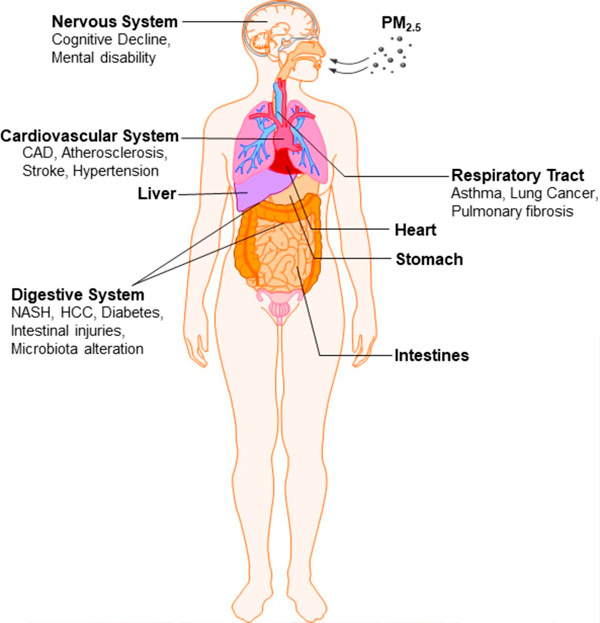How does air pollution affect the digestive system?
Last reviewed: 14.06.2024

All iLive content is medically reviewed or fact checked to ensure as much factual accuracy as possible.
We have strict sourcing guidelines and only link to reputable media sites, academic research institutions and, whenever possible, medically peer reviewed studies. Note that the numbers in parentheses ([1], [2], etc.) are clickable links to these studies.
If you feel that any of our content is inaccurate, out-of-date, or otherwise questionable, please select it and press Ctrl + Enter.

Fine particles, less than 2.5 micrometers in diameter (PM2.5), are major air pollutants associated with a variety of health problems. These particles can penetrate deep into the lungs and even enter the bloodstream when inhaled. Recent studies show a serious health threat: exposure to PM2.5 can also damage the digestive system, including the liver, pancreas and intestines.
Recent research has focused on how exposure to PM2.5 causes stress responses in cells of the digestive system. These reactions involve specialized subcellular structures in cells called organelles, such as the endoplasmic reticulum (ER), mitochondria, and lysosomes. When PM2.5 disrupts these organelles, it creates a chain reaction within cells that can lead to inflammation and other harmful effects.
The liver, the primary organ for detoxification and metabolism, is particularly susceptible to damage from PM2.5. Research has shown that exposure to PM2.5 can lead to a number of problems in the liver, including inflammation, stress reactions, organelle damage and disruption of energy metabolism. These effects may contribute to the development of non-alcoholic fatty liver disease (NASH) and type 2 diabetes.
The effects of PM2.5 are not limited to just the liver. It can also harm the pancreas and intestines. Research has linked PM2.5 to an increased risk of pancreatic dysfunction in people with diabetes, as well as damage to intestinal cells and increased permeability. This increase in permeability can lead to various digestive problems.
Although the latest research provides valuable data, key questions remain. Scientists continue to study how cells perceive PM2.5 and how the stress response differs in different organs of the digestive system. In addition, they are examining how exposure to PM2.5 affects interactions between different organs of the digestive system, which may affect overall digestive function.

Finally, researchers are exploring whether dietary or pharmaceutical interventions can mitigate the damage from PM2.5. Interestingly, some studies suggest that certain nutrients, such as monounsaturated fatty acids and vitamins, may provide some protection against the harmful effects of PM2.5.
Air pollution is a complex problem with no easy solutions. While research continues, mitigating the effects of PM2.5 and the current understanding of its effects on the digestive system highlight the far-reaching impacts of air pollution on human health. This highlights the need for continued efforts to reduce air pollution and develop strategies to protect against its harmful effects.
The study was published in the journal eGastroenterology.
